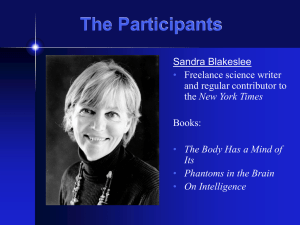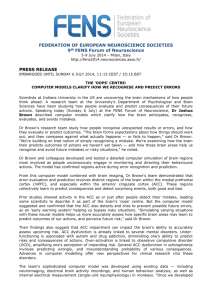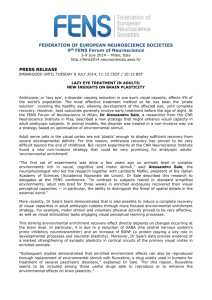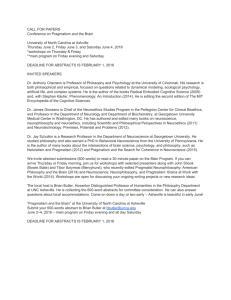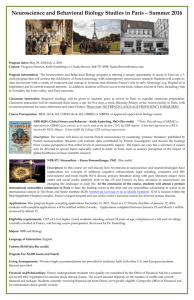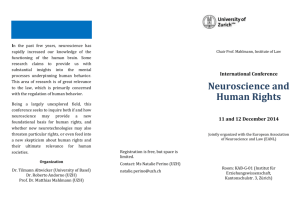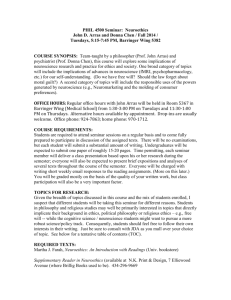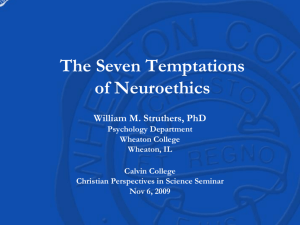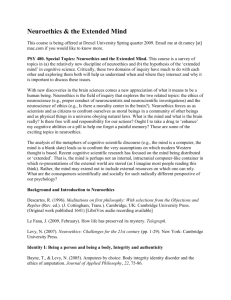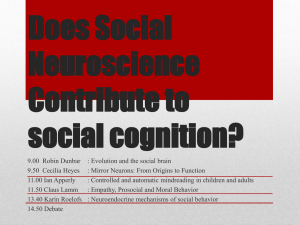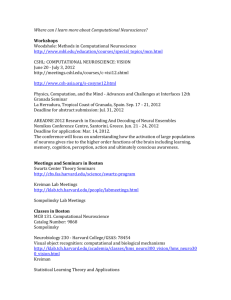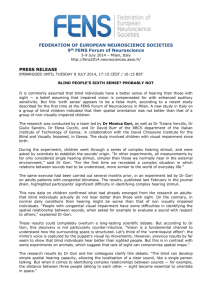how far should we go - 9th FENS Forum of Neuroscience
advertisement
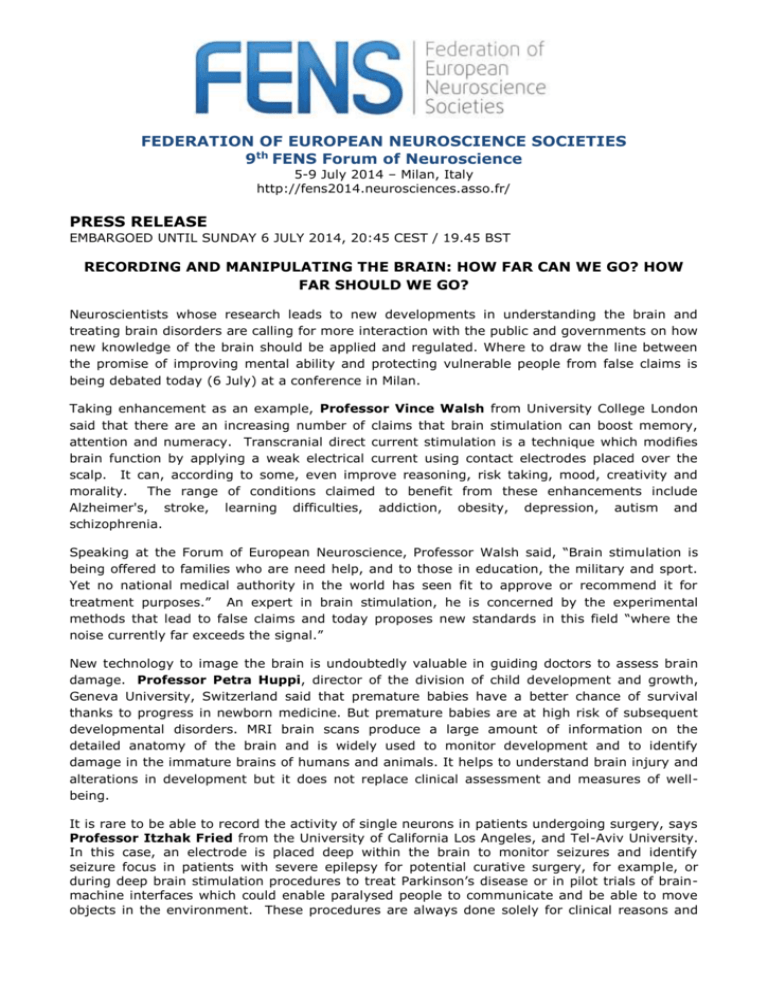
FEDERATION OF EUROPEAN NEUROSCIENCE SOCIETIES 9th FENS Forum of Neuroscience 5-9 July 2014 – Milan, Italy http://fens2014.neurosciences.asso.fr/ PRESS RELEASE EMBARGOED UNTIL SUNDAY 6 JULY 2014, 20:45 CEST / 19.45 BST RECORDING AND MANIPULATING THE BRAIN: HOW FAR CAN WE GO? HOW FAR SHOULD WE GO? Neuroscientists whose research leads to new developments in understanding the brain and treating brain disorders are calling for more interaction with the public and governments on how new knowledge of the brain should be applied and regulated. Where to draw the line between the promise of improving mental ability and protecting vulnerable people from false claims is being debated today (6 July) at a conference in Milan. Taking enhancement as an example, Professor Vince Walsh from University College London said that there are an increasing number of claims that brain stimulation can boost memory, attention and numeracy. Transcranial direct current stimulation is a technique which modifies brain function by applying a weak electrical current using contact electrodes placed over the scalp. It can, according to some, even improve reasoning, risk taking, mood, creativity and morality. The range of conditions claimed to benefit from these enhancements include Alzheimer's, stroke, learning difficulties, addiction, obesity, depression, autism and schizophrenia. Speaking at the Forum of European Neuroscience, Professor Walsh said, “Brain stimulation is being offered to families who are need help, and to those in education, the military and sport. Yet no national medical authority in the world has seen fit to approve or recommend it for treatment purposes.” An expert in brain stimulation, he is concerned by the experimental methods that lead to false claims and today proposes new standards in this field “where the noise currently far exceeds the signal.” New technology to image the brain is undoubtedly valuable in guiding doctors to assess brain damage. Professor Petra Huppi, director of the division of child development and growth, Geneva University, Switzerland said that premature babies have a better chance of survival thanks to progress in newborn medicine. But premature babies are at high risk of subsequent developmental disorders. MRI brain scans produce a large amount of information on the detailed anatomy of the brain and is widely used to monitor development and to identify damage in the immature brains of humans and animals. It helps to understand brain injury and alterations in development but it does not replace clinical assessment and measures of wellbeing. It is rare to be able to record the activity of single neurons in patients undergoing surgery, says Professor Itzhak Fried from the University of California Los Angeles, and Tel-Aviv University. In this case, an electrode is placed deep within the brain to monitor seizures and identify seizure focus in patients with severe epilepsy for potential curative surgery, for example, or during deep brain stimulation procedures to treat Parkinson’s disease or in pilot trials of brainmachine interfaces which could enable paralysed people to communicate and be able to move objects in the environment. These procedures are always done solely for clinical reasons and under strict guidelines, yet the knowledge gained can significantly expand our understanding of brain function potentially leading to the development of new therapies. Chairing the William Safire seminar on neuroethics, Professor Barbara Sahakian from Cambridge University, UK, and president of the International Neuroethics Society said, “Basic research in humans involving procedures that might modify brain function could rapidly advance our knowledge of the brain in health and disease. These studies may also reduce the need for research on non-human primates. But at the same time, we have to examine the risks involved to the individual participating, and when there is no direct benefit to those participating in the research, ask, ‘Can it be justified?’” In her concluding remarks, Professor Sahakian explained that there is not a single more important problem than understanding the brain in health and disease. Neuropsychiatric disorders are the second cause of disability-adjusted life years (DALYs) in Europe. There has been an explosion of neuroscience techniques, which can be applied to tractable, important problems. Many of these will be applied in the Human Brain Project. “We need to ensure that techniques are applied for the benefit of society to ensure brain health and wellbeing for a flourishing society. However, we must also be concerned about possible harms associated with the use of these techniques and how they may alter society as we know it. Forward consideration of the ethical, legal and social implications of neuroscience will ensure maximum benefits and minimal harms for both the individual and society,” she said. END Special Interest Event SiE04 - William Safire Seminar on Neuroethics Contact FENS Press Office and all media enquiries: Elaine Snell, Snell Communications Ltd, London UK (English language) tel: +44 (0)20 7738 0424 or mobile +44 (0)7973 953 794 email: Elaine@snell-communications.net Mauro Scanu (Italian language) tel: +39 333 161 5477 email: press.office@fens.org NOTES TO EDITORS The purpose of the William Safire Seminar on Neuroethics is to increase interest in neuroethics and to engage neuroscientists in a range of ethical issues surrounding developments in brain research. The topic this year is basic research on the human brain. The seminar is hosted by the International Neuroethics Society and the European Dana Alliance for the Brain The 9th FENS Forum of Neuroscience, the largest basic neuroscience meeting in Europe, organised by FENS and hosted by the The Società Italiana di Neuroscienze (SINS) (Italian Society for Neuroscience) will attract an estimated 5,500 international delegates. The Federation of European Neuroscience Societies (FENS), founded in 1998, aims to advance research and education in neuroscience, representing neuroscience research in the European Commission and other granting bodies. FENS represents 42 national and mono-disciplinary neuroscience societies with close to 23,000 member scientists from 32 European countries. http://fens2014.neurosciences.asso.fr/
